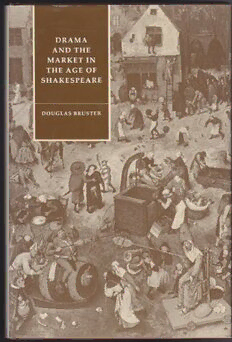
Drama and the Market in the Age of Shakespeare PDF
180 Pages·1992·4.664 MB·English
Most books are stored in the elastic cloud where traffic is expensive. For this reason, we have a limit on daily download.
Preview Drama and the Market in the Age of Shakespeare
Description:
Douglas Bruster's provocative study of English Renaissance drama explores its links with Elizabethan and Jacobean economy and society, looking at the status of playwrights such as Shakespeare and the establishment of commercial theatres. He identifies in the drama a materialist vision which has its origins in the climate of uncertainty engendered by the rapidly expanding economy of London. His examples range from the economic importance of cuckoldry to the role of stage props as commodities, and the commercial significance of the Troy story in Shakespeare's Troilus and Cressida, and he offers new ways of reading English Renaissance drama, by returning the theatre and the plays performed there, to its basis in the material world.
See more
The list of books you might like
Most books are stored in the elastic cloud where traffic is expensive. For this reason, we have a limit on daily download.
